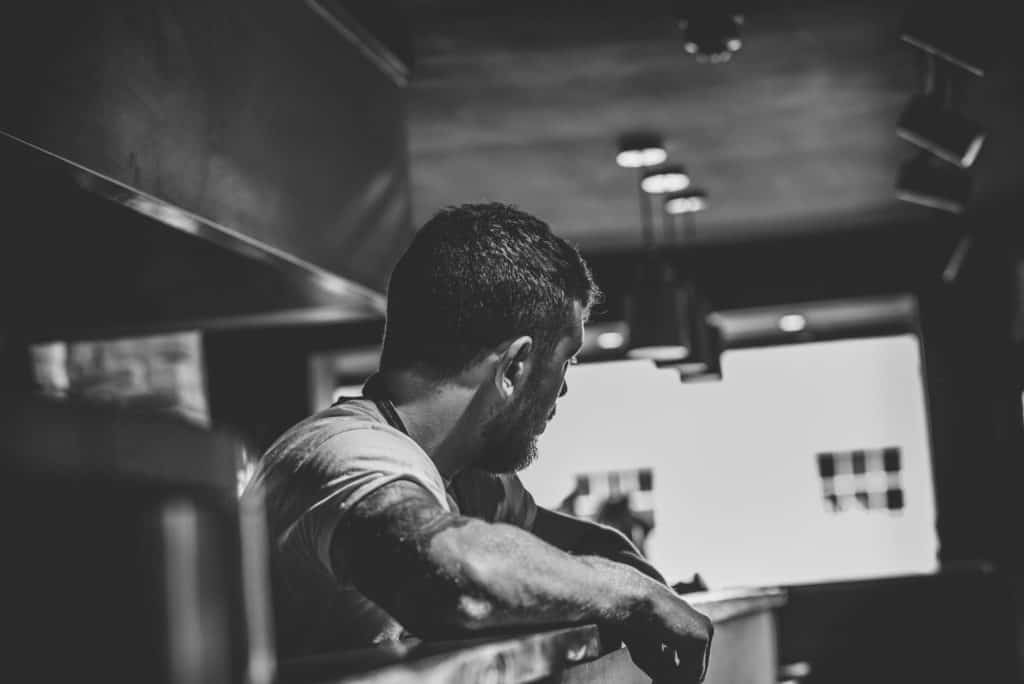
Having spent several of my chef career years working in standalone restaurants I have a deep understanding of the positive as well as the negatives of this type of work environment.
Being a chef in a restaurant requires a high level of adaptability. It can be difficult to accurately predict the number of customers we are going to serve each day and when those peak times may be.
Some readers may now be asking, “surely all chefs work in restaurants? and “Whats the difference between a hotel restaurant and a standalone one?” In my experience, there are many differences between being a chef in a hotel restaurant and working in a standalone restaurant.
restaurant and working in a standalone restaurant.
This is perhaps the number one consideration with this type of work venue, although there are many others that we will look at in this article.
The majority of restaurants take bookings, however, it can be difficult to judge the expected number of customers each day. I have gone into work many times expecting a quiet Tuesday, only to end up running around the kitchen like a mad man trying to keep up with the stream of orders suddenly coming in.
like a mad man trying to keep up with the stream of orders suddenly coming in.
It’s hard to pinpoint what causes these customer spikes. Perhaps it is just a sunny day and everyone decides a lunch in a pub beer garden is the perfect way to spend that day. All of a sudden, the number of covers our restaurant can serve has doubled!
Below is a table which briefly sums up the pros and cons of working in a standalone restaurant kitchen, for those readers in a rush! (By standalone restaurant I mean a typical restaurant that doesn’t offer accommodation or one that is not part of a hotel)
| Pros | Cons |
|---|---|
| Great team atmosphere | Hard to predict customer numbers accurately |
| Learn a wide variety of skills early on | Get less volume of experience on each section |
| Generally later starts / no super early breakfast shifts | Often working later into the night |
| Greater Tips | Can be expected to help wash dishes and mop floors |
| Everyone helps each other | Less room to work |
| Lots of local restaurants to choose from | Less career progression opportunities |
That table has hopefully provided a brief overview of the main points to consider when looking at taking a chef job in a standalone restaurant. We can now take a look at these points in more detail to understand what they actually mean!
First of all, let’s look at how a restaurant kitchen is set up which makes it different from a hotel kitchen.
How Is A Restaurant Kitchen Organised?

Standalone restaurants will typically have a smaller kitchen than that of a hotel. This requires that they are set up in a different way.
A restaurant kitchen is usually set up in a less formal manor. Although there are still sections, the smaller work space dictates that these sections are more fluid. For example, the veg section may also have to double up as the fish section.
The biggest challenge in this type of environment is allowing space for the chefs to work alongside each other. By nature, chefs (and their chopping boards ) can take up a large amount of space.
) can take up a large amount of space.
It can be very difficult trying to prep a meat dish whilst bumping shoulders with the chef next to you prepping the veg. Of course the food hygiene rules regarding cross contamination also come into play.
In contrast, larger kitchens (like the ones typically found in hotels), will have more clearly defined sections  and the tasks for each chef on those sections are more rigid. This is not always the case in smaller restaurant kitchens where an everyone helps each other attitude is the norm.
and the tasks for each chef on those sections are more rigid. This is not always the case in smaller restaurant kitchens where an everyone helps each other attitude is the norm.
How Does A Restaurant Brigade Operate?
Some restaurant kitchens are large and able to give their chefs clearly defined roles. Most however, are small teams that rely on an ‘every one pitch in and help each other’ mentality.
Chefs that work in a standalone restaurant setting typically find that they have a greater variety of work than in a large hotel kitchen. The smaller brigade size means that experience in all sections becomes more vital as we may be asked to jump from one section to the next.
When I have worked in standalone restaurants I have always been part of a smaller team of 4 or 5 chefs. This meant that the type of work I did on a day to day basis was more varied.
was more varied.
I may have begun the day making the bread, before moving on to prep the fish that came in, before moving on to the deserts for that evening. It really was a mixed bag based on the needs and staff members present that day.
In contrast to my time spent in a large hotel setting; when I worked on the veg section, I would only prep and cook the veg and accompanying dishes all day long.
This leads us onto the biggest pro to working in a small restaurant for beginners.
As a commis starting out we are often eager to learn as much as possible about a wide variety of different dishes and cooking skills.
starting out we are often eager to learn as much as possible about a wide variety of different dishes and cooking skills.
Smaller restaurants provide us with this opportunity. Commis chefs will be given many different tasks early on. In contrast, as a commis chef I got frustrated after spending my first 6 months seemingly prepping nothing but veg in a large hotel.
after spending my first 6 months seemingly prepping nothing but veg in a large hotel.

However, the downside of the smaller restaurant is that there are less chefs to learn from which limits our ability to learn from great people. Also the amount of practice we get at cooking one type of dish is limited.
By the time I moved sections after 6 months, my veg prep was super fast and I had basics such as risottos etc down to a fine art. It would take a long time for a commis in a smaller kitchen to get to that level as they have spent some of their learning time on other tasks.
What Is The Team Atmosphere Like In Restaurant Kitchens?
The team atmosphere in kitchens is always great, but it can be extra special in smaller restaurant kitchens.
Smaller teams enhance the ‘in it together’ attitude, particularly if the whole brigade has the same days off due to the restaurant closing on those days.
due to the restaurant closing on those days.
Small teams develop a closeness from getting through difficult services together, and it feels like a team victory. In contrast, the shift patterns of large hotel brigades mean that we often don’t see or work closely alongside some of our fellow chefs for weeks at a time.
Restaurant chefs tend to pitch in and help their colleagues a bit more in all areas including the dish washer if required! Whilst a larger kitchen can allow a chef to hide (if they are having a quieter night and do not feel the need to come to the rescue of their colleagues).
a bit more in all areas including the dish washer if required! Whilst a larger kitchen can allow a chef to hide (if they are having a quieter night and do not feel the need to come to the rescue of their colleagues).
I briefly mentioned, as restaurant chefs, we can have the same days off. This is one of a few important factors around the shift patterns of being a chef in this type of kitchen
of being a chef in this type of kitchen
What Shift Patterns Do Chefs In Restaurants Do?
One of the great benefits of standalone restaurants is that they do not have to provide breakfasts for their guests.
Some restaurants choose to offer a breakfast menu, but this is not a requirement and is usually a later start time. Many simply choose to focus solely on lunch and dinner customers, or even just one of those peak times.
The flexibility of the shift patterns in a restaurant kitchen can be a large benefit for chefs. When I changed from a hotel kitchen to a restaurant kitchen the fact I no longer had to take a turn at 7am starts on the breakfast rota was a huge bonus!
When a restaurant focuses on lunch and dinner, the chefs will usually start at around 9 or 10 am depending on their work load for that day. They may then do a mixture of straight or split shifts.
Certain locations , particularly those with a heavy concentration of business orientated people are actually busier at lunch than at evening times.
, particularly those with a heavy concentration of business orientated people are actually busier at lunch than at evening times.

This requires them to have more chefs on during the middle part of the day allowing them to offer more evenings off to their chefs. This can be a huge bonus for the chefs that work there.
What we do often see, is restaurants that are popular in the evenings staying open later into the night than a hotel restaurant. This can make a late finish for those working in the kitchen.
restaurant. This can make a late finish for those working in the kitchen.
As mentioned before, the fact that everyone is expected to help each other also has an affect on the finish time. An advantage of hotel work is that once the last main meals have been served, the kitchen is cleaned down and it’s home time.
The pastry chefs stay behind to serve the final desserts and the KPs mop the floors and clean the sides.
mop the floors and clean the sides.
In a smaller kitchen setting this doesn’t really happen. The pastry chef is part of the main team and everyone pitches in together to get the last desserts out the door.
Often the KP will be so busy washing dishes that the chefs are required to muck in and help clean the pots and pans, and scrub the floors. Again this all adds up to a later finishing time.
How Much Money Do Restaurant Chefs Make?
The wages paid to chefs that work in a standalone restaurant are broadly similar to that paid by hotel kitchens.However, I have found from experience that the amount earned may lean slightly higher to the standalone restaurant chefs.
A valued member of a smaller team is more likely to be given the compensation they require in order to stay.
in order to stay.
The disruption caused by one member of a small team leaving is far greater than that caused by one person leaving a large team.
In a larger brigade, such as those found in hotels, it can be harder to stand out from the crowd.
Large brigades can have the attitude that the work one chef does will be picked up by all the others if they choose to leave. Therefor the owner is less likely to give into their pay demands.
In my experience, the biggest pay difference between the two work locations I have found, is in the tips .
.
As part of a hotel, any tips that are given are divided out among a huge number of staff members. In a restaurant the team is a lot smaller so a bigger portion of the tips are given to each person.
I also feel like the smaller team means that a fairer portion of the tips go towards the chefs. Waiting staff are far more likely to honestly declare the tips they are receiving if they are friends with the chefs and everyone feels like they are part of the same team.
are far more likely to honestly declare the tips they are receiving if they are friends with the chefs and everyone feels like they are part of the same team.
To Sum Up
From my experience working as a chef in both standalone restaurants and hotel restaurants the main difference is the adaptability required in a standalone restaurant kitchen.
For those chefs that enjoy variety and would benefit from a smaller team atmosphere ; a restaurant is probably the way to go.
; a restaurant is probably the way to go.
For those chefs who enjoy structure and lots of career progression opportunities; hotel kitchen work is a great option.
opportunities; hotel kitchen work is a great option.
